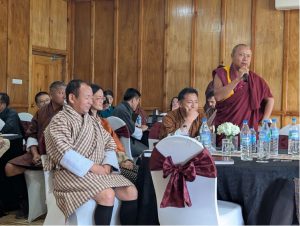Join the Leading Global Eye Health Alliance.
Membership-
Choose an alternate language here
On 1 July 2025, Bhutan launched the WHO SPECS 2030 Initiative, a milestone step towards ensuring that every individual in need of refractive error care can access quality, affordable, and people-centred eye health services. The event was spearheaded by the Ministry of Health, National Medical Services, and WHO SEARO, in close collaboration with both national and international stakeholders.
 The launch was followed by a three-day stakeholder workshop for developing the Bhutan Eye Health Strategy 2025–2030. This workshop brought together a remarkably diverse group of stakeholders which included Ministry of Health and Ministry of Education, district public health officials, and ophthalmic professionals from across the country to civil society organizations, monastic institutions, and even patients with visual impairments. What made the workshop truly unique was its human-centered approach; it went beyond policy and targets to amplify the voices of those directly affected.
The launch was followed by a three-day stakeholder workshop for developing the Bhutan Eye Health Strategy 2025–2030. This workshop brought together a remarkably diverse group of stakeholders which included Ministry of Health and Ministry of Education, district public health officials, and ophthalmic professionals from across the country to civil society organizations, monastic institutions, and even patients with visual impairments. What made the workshop truly unique was its human-centered approach; it went beyond policy and targets to amplify the voices of those directly affected.
One such voice was that of a young university student who stood up to share her heartfelt story. She spoke about the frustration of not being able to see the blackboard, and how her parents worked tirelessly to save enough to buy her first pair of glasses. “The day I put on those glasses,” she said, “I saw the world as if for the first time. Everything was so clear. It changed my life.” She continues to wear spectacles with pride, a simple but life-changing intervention that underscores the importance of this initiative.
Over three intensive days, the participants worked with Bhutan’s national ECSAT tool, along with findings from past RAAB and RESC surveys, to develop a robust, forward-looking strategy aligned with the WHO’s Integrated People-Centred Eye Care (IPEC) framework and the IAPB 2030 In Sight Strategy.
The strategy will focus on Leadership and governance, equitable access and quality of services, workforce development and infrastructure, sustainable financing and data and information. Bhutan’s present eREC stood at 48% and eCSC at 22%. Bhutan aims to formally launch this comprehensive National Eye Health Strategy during World Sight Day in October this year.